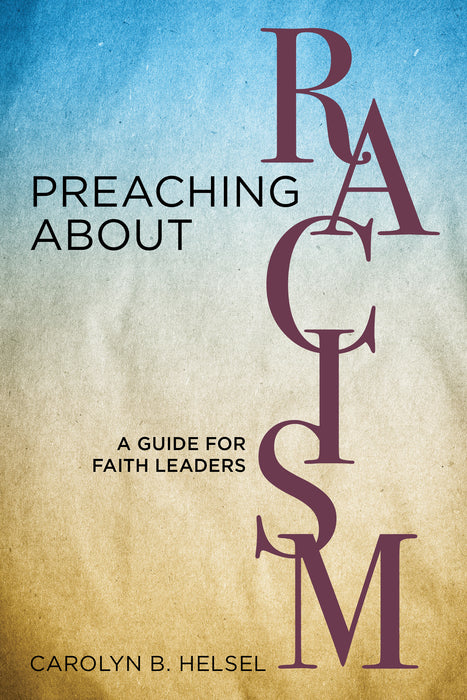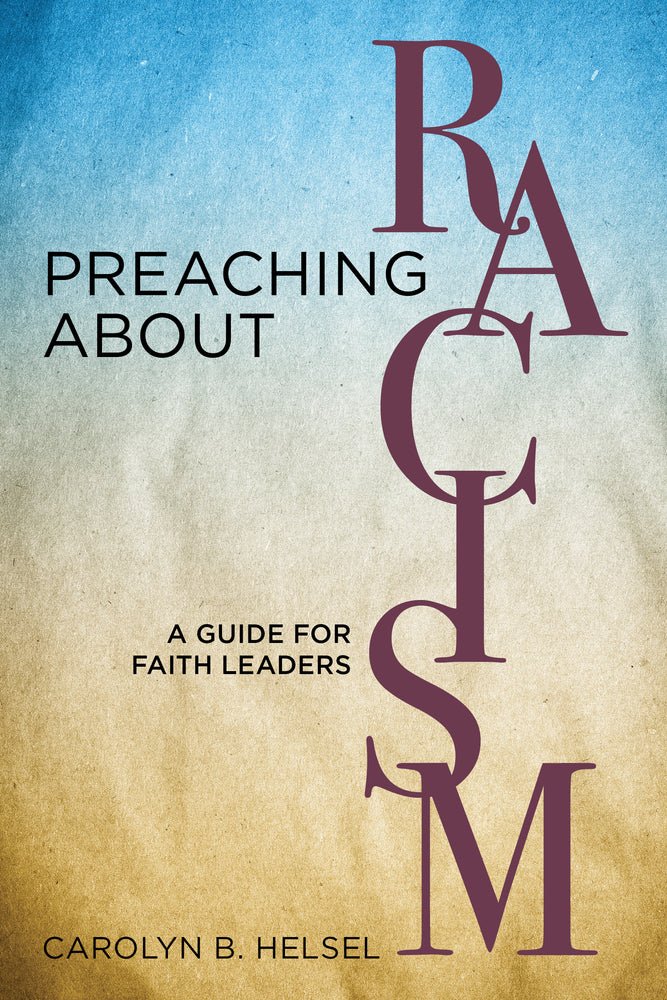Preaching about Racism: A Guide for Faith Leaders
By Carolyn B. Helsel
Book of the Year Award 2019, Academy of Parish Clergy
"Helsel is both unflinching about the need for transformative preaching and honest about its challenges.”—Eric Barreto, Princeton Theological Seminary
You know you must address racism from the pulpit, but how do you do it thoughtfully, sensitively, and biblically? In this follow-up to her bestselling Anxious to Talk about It: Helping White Christians Talk Faithfully about Racism, homiletics professor and pastor Carolyn Helsel addresses the urgency of preaching about racism and provides strategies and a theoretical framework for crafting biblical, theological sermons that incorporate insights from social sciences and psychology, gleaned from more than a decade of writing and teaching about racism. Helsel also offers ten myths about racism your listeners may be carrying, as well as responds to five potential objections pastors can face when choosing to preach about racism.
Written for the busy pastor, several chapters are quick reads – helpful reminders as you prepare a thoughtful and sensitive sermon – while others dig deeper on the theory behind the crucial work of dismantling racism.
Chapters include: Communicating What Racism Means; Talking about Racial Identity with White People of Faith; Biblical Preaching about Racism; Theology for Preaching about Racism; Strategies for Preaching and Beyond. The Appendix includes sample sermons to help get you started.
Endorsements"In Preaching About Racism, Carolyn Helsel deeply engages with the challenging topic of race and racism from diverse theoretical and theological perspectives, and writes about it in highly readable and compelling manner. Prophetic preaching about racism to white congregations often stimulates feelings of guilt and shame, and demoralizes people. However, Helsel reminds readers that at the heart of preaching on racism is a deep sense of gratitude for God’s ongoing redemptive work in a broken, racist world."―Homiletic: The Journal of the Academy of Homiletics Vol. 44, No. 1 (2019)
"As I read Carolyn Helsel's important new book for preachers of all faith communities, I kept repeating the same thing: 'Wow. That chapter alone was worth the price of the book!' I felt that for the Prologue, and again with the list of myths in Chapter 3, then again with the summary of racial identity theory in Chapter 4, and ... basically, with every chapter in the book. Helsel gets what so many preachers - and the predominantly white congregations they serve - so desperately need in these critical times."―Brian D. McLaren, author/speaker/activist
"If you are a white preacher in a white congregation who reads Michelle Alexander and Bryan Stevenson, this book is for you. Helsel provides an indispensable guide to help white preachers re-translate the Christian story in light of the biblical, theological, and historical research of scholars of color. This book is not a primer on preaching about racism: rather it shows you how to center everyday anti-racist practices into your weekly sermon preparation. Becoming anti-racist is ongoing work, and Helsel cares for the reader without sacrificing her prophetic claim that to follow the way of Jesus is to take part in dismantling racism in the US today."―Dori Baker, Senior Fellow, Forum for Theological Exploration
“As a pastor, professor, and preacher this book gives me courage, strength, and a determination to preach to the dried up bones we call the church. It is my prayer that white faith leaders will find here in this book fresh hints of God’s unfolding future, along with a charge and challenge to confront the great issue of our time: racism. Carolyn Helsel has masterfully crafted a book that engages today’s preacher, and allows us to find our own voice in the pulpit. I find this book a hope-filled account of God’s unwillingness to give up on God’s preacher and Christ’s Church. This work of homiletical art should be read and consumed by all.”―Robert W. Lee IV, Appalachian State University and author of A Sin by Any Other Name
Perhaps no subject is as fraught for the white preacher as race. And yet perhaps no subject may be as vital for churches to grapple with theologically today. Helsel expertly guides preachers and communities into a homiletical imagination that can help transform these communities by centering and embracing the good news that Jesus has delivered us from the multifold sins of racial superiority. Eschewing facile calls to unity masquerading as privilege while embracing the complexities of the witness of Scripture, theology, and proclamation, Helsel is both unflinching about the need for such transformative preaching and honest about its challenges. In this way, she offers preachers and lay people alike a path towards the kind of repair our world yearns for most today."―Eric Barreto, Princeton Theological Seminary and co-editor of Reading Acts in the Discourses of Masculinity and Politics
"Despite frequent discourses on race/racism and the awareness of its tragic history in our country, the lack of knowledge among Euro-Americans about the roots and manifestations of racist ideology in our society is shocking. This lack of awareness is prevalent on many levels including individual, political and institutional. Racism in the church has devastating effects upon its victims, and as well as upon church ministries. Carolyn B. Helsel is courageous and prophetic in tackling such a controversial subject. Her book, as its subtitle suggest, is directed at 'white faith leaders.' Dr. Helsel discusses the challenges that Euro-Americans might face in addressing racism. She tackles simple issues, such as engaging in dialogue about race perpetuates racism, to more profound theological implications, such as the issue of sin. It is incumbent upon faith leaders to on with issues of race and racism in genuine and practical ways if we are to reach our congregants. Towards this goal the book, Preaching About Racism: A Guide for Faith Leaders is a must read." ―Samuel Cruz, Union Theological Seminary


